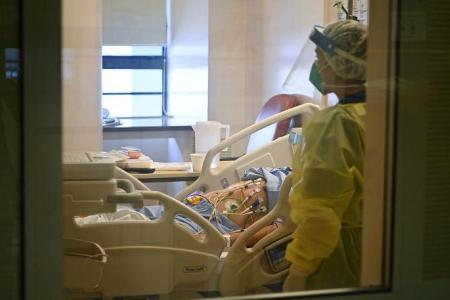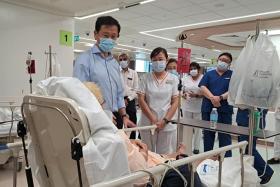Hospitals will stop setting aside whole wards for Covid-19 patients: Ong Ye Kung
Hospitals will no longer set aside entire wards for Covid-19 patients, Health Minister Ong Ye Kung told Parliament on Tuesday. This will free up beds that can be used by other patients and help ease the gridlock at emergency departments (ED), he said.
Mr Ong said the practice is no longer necessary as most of the population are vaccinated and have good protection against severe illness. Instead, hospitals will manage Covid-19 patients the same way they do all other patients - based on the severity of their condition.
Responding to questions from nine MPs, he said that anticipating large numbers of patients from the Covid-19 XBB wave, public hospitals had ringfenced 800 beds. But only about 80 per cent were used at peak, with as many as 300 beds empty off-peak.
“Although this is not a big number, it nevertheless constrains hospital operations and impedes the clearing of patients waiting for beds at the EDs,” said Mr Ong, adding that even a small mismatch in demand and supply of a couple of hundred beds will cause waiting times to spike significantly.
“This flexibility is important to our hospitals, to help them optimise the use of beds. In a crunch situation, it makes all the difference,“ he said, while stressing that hospitals will continue with precautionary measures to prevent the spread of infectious diseases.
The crowded conditions are being resolved, though this has not been easy to do in the middle of a pandemic. Successive waves of infection diverted attention and resources to fighting immediate fires, said Mr Ong.
Construction disruptions that delayed the opening of new medical facilities added to the woes. But new nursing homes are now opening following construction delays, he noted.
From the end of 2023, the Woodlands Health Campus and the Tan Tock Seng Hospital Integrated Care Hub will also progressively open. With the expanded Singapore General Hospital Medical Campus, they will add 1,900 more public hospital beds in the next five years, said Mr Ong.
Meanwhile, the use of step down facilities is being ramped up to alleviate the bed crunch. Patients in stable condition waiting to be discharged or transferred to a step down facility like a nursing home, are being moved out to Transitional Care Facilities (TCF).
TCFs are run by the private sector, in close partnership with a public hospital. Three TCFs with a total of 400 beds are already in use, with more being planned.
Mr Lim Biow Chuan (Mountbatten) asked if TCFs cost more, as they are run by the private sector. Mr Ong replied that they do not, as patients pay the same rates as in a public hospital.
In spite of the heavy workload at EDs, patients with life-threatening conditions are attended to immediately, said Mr Ong.
Emergency cases that are not life-threatening waited an average of 20 minutes to be seen by a doctor in the first nine months of the year. In that period, half of the ED patients who needed to be hospitalised got a bed in about seven hours or less.
Compared to 2019, before the pandemic hit, the number of patients turning up at EDs has fallen by 16 per cent - from 2,500 a day to 2,100 a day.
But visits to EDs are volatile during a pandemic, added Mr Ong, with 600 more patients turning up at the peak of the Omicron and XBB waves, a 30 per cent spike to the ED workload.
“In absolute numbers, this is an increase of a few hundred patients every month. It is not huge but adds to the workload of the EDs,” he said.
The proportion of patients who went to EDs with very serious conditions and needing the most attention had also gone up from 8 per cent in 2019 to 11 per cent this year, said Mr Ong.
Dr Lim Wee Kiak (Sembawang GRC) asked about the backlog of elective surgeries delayed due to the pandemic. Mr Ong said this is not large, as only about 5 to 10 per cent of surgeries were postponed in the latest wave, and will be cleared as soon as possible.
Mr Gerald Giam (Aljunied GRC) asked if more home support can be given so patients can be discharged earlier. Mr Ong replied that this is being looked at, alongside other alternatives such as nursing homes, step-down care and community hospitals. He noted that while home discharge frees up hospital beds, it is manpower-intensive and adds to the workload of nurses.
Mr Ong hoped that even if service levels drop and waiting times become longer, “our hospitals and healthcare workers will continue to receive the appreciation, understanding and support of all Singaporeans.”
Get The New Paper on your phone with the free TNP app. Download from the Apple App Store or Google Play Store now


